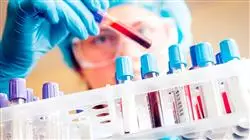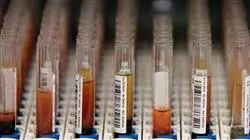University certificate
The world's largest faculty of nursing”
Why study at TECH?
Improve your skills and acquire new competencies on Excellence as a Healthcare Quality Model, thanks to the best online university in the world according to Forbes, thanks to TECH"

The implementation of an effective quality and safety management system can significantly improve healthcare and reduce risks to patients. Continuous improvement of these processes enables organizations to adapt and and excel in response to changing patient needs and market demands.
For this reason, TECH has designed a Postgraduate diploma in Quality and Safety Management Systems for Nursing to provide students with the necessary skills and competencies to be able to perform their work as specialists with the highest possible efficiency and quality. Thus, throughout this program, aspects such as Safety Culture, Incident Management, Errors and Adverse Events in Health Care, Clinical Simulation in Virtual Environments or Quality Controls of the facilities will be addressed.
All this, thanks to a convenient 100% online mode that allows students to organize their schedules and studies, being able to combine them with their other daily work and interests. In addition, this program has the most complete theoretical and practical materials on the market, greatly facilitating the student's study process and allowing them to achieve their objectives quickly and efficiently.
Become an expert in Healthcare Quality and Emergency Plans in only 6 months and with total freedom of organization"
This Postgraduate diploma in Quality and Safety Management Systems for Nursing contains the most complete and up-to-date scientific program on the market. The most important features include:
- The development of case studies presented by healthcare experts in Quality Management Systems and Healthcare Safety.
- Graphic, schematic, and practical contents with which they are created, provide scientific and practical information on the disciplines that are essential for professional practice.
- Practical exercises where self-assessment can be used to improve learning.
- Its special emphasis on innovative methodologies
- Theoretical lessons, questions to the expert, debate forums on controversial topics, and individual reflection assignments
- Content that is accessible from any fixed or portable device with an Internet connection
Maximize your knowledge of Quality Management Systems and Healthcare Safety in just a few months and from any device with an Internet connection"
The program’s teaching staff includes professionals from sector who contribute their work experience to this educational program, as well as renowned specialists from leading societies and prestigious universities.
Its multimedia content, developed with the latest educational technology, will provide the professionals with situated and contextual learning, i.e., a simulated environment that will provide an immersive education programmed to learn in real situations.
The design of this program focuses on Problem-Based Learning, by means of which the professionals must try to solve the different professional practice situations that are presented throughout the academic course. For this purpose, the students will be assisted by an innovative interactive video system created by renowned experts.
A qualification that will improve your skills and multiply your chances of succeeding in one of the most promising areas in the field of Nursing"

Delve into aspects such as Environmental Safety or Risk Management, without the need to travel and from the comfort of your home or work office"
Syllabus
The structure and all the didactic resources of this syllabus have been designed by the renowned professionals that make up TECH team of experts in the field of Nursing. These specialists have poured their experience and knowledge to create the most complete and updated content possible. All this, based on the most efficient pedagogical methodology, TECH Relearning.

Thanks to this complete syllabus you will be able to be up to date on Safety in Sanitary Installations and Emergency Plans"
Module 1. Healthcare Quality Management Systems in Healthcare Institutions
1.1. Quality of Care Methodology for Quality Management
1.1.1. Quality of Care
1.1.2. Quality Dimensions
1.1.3. Methodology for Quality Management
1.2. Quality Management Systems
1.2.1. Components of Quality Management System
1.2.2. Quality Costs
1.2.3. Reference models in Quality and Excellence
1.2.4. Quality Management in Healthcare Institutions
1.3. Quality Control Excellence as a Quality Model
1.3.1. Quality Control Audit
1.3.2. Evaluation cycle. Quality Components
1.3.3. Continuous Quality Improvement
1.3.4. Excellence as a Quality Model
1.3.4.1. The Principle of Excellence
1.4. Quality Assessment and Improvement Method
1.4.1. Quality components
1.4.2. Evolution of Quality Management Systems
1.4.2.1. Quality Control
1.4.2.2. Quality Assurance
1.4.2.3. Total quality (excellence) and continuous improvement
1.5. Processes for the improvement of Health Care
1.5.1. Process Management
1.5.2. Design of Assistance Processes
1.5.3. Quality Standards
1.5.3.1. Evaluation of the Assistance Processes
1.6. Strategies for Improving Effectiveness and Applying Evidence in Clinical Practice
1.6.1. Clinical Practice Guideline. Evidence-Based Tools
1.6.2. Good clinical practice: Standards, Monitoring
1.6.3. Assessment of Results to Clinical Practice
1.7. Planning a Continuous Improvement Plan
1.7.1. The PDCA cycle
1.7.2. Planning, Implementation
1.7.3. Checking and Performance
1.8. External Evaluation and Accreditation Models
1.8.1. External Evaluation in Quality Management
1.8.2. Accreditation Models
1.8.3. Accreditation in the healthcare field
1.9. Leadership and People Management for Quality Improvement
1.9.1. Leadership and Talent Management in Healthcare Organizations
1.9.2. Principles of Motivation in Professionals in Healthcare Organizations
1.9.3. Effective People Management Tools for Quality Improvement
1.10. Assessment of the Quality of Care and Management within the hospital
1.10.1. Quality management within the hospital environment
1.10.2. Structure, process and results in the evaluation of quality management in hospitals
1.10.3. Models and standards of excellence in Quality Management in the hospital environment
Module 2. Errors in Health Care and Adverse Events
2.1. The Error in Health Care. Conditioning Factors
2.1.1. The Error in Health Care. Magnitudes
2.1.2. Security Culture
2.1.2.1. Understanding, Recognizing and Managing Adverse Events
2.1.3. Incident Notification and Management
2.2. Identification of Critical Points in an Organization. Health Care Processes
2.2.1. Situation analysis on the identification of Critical Risk Points
2.2.2. Approach and Prevention Strategies
2.2.3. Critical Risk Point Communication Plan
2.3. Risk Management Incidents and Adverse Events
2.3.1. Models, Methods and Tools
2.3.2. Notification Systems. Adverse Event Registry
2.3.3. Identification of Adverse Events through the Analysis of Clinical Histories
2.3.3.1. Global Trigger Tool
2.4. Proactive Risk Management
2.4.1. Risk Prevention Proactive Management Tools
2.4.2. Failure Mode and Effects Analysis (FMEA)
2.4.3. Application of the Methodology in a Health Care Process
2.5. Sentinel Event Analysis Methodology
2.5.1. Root Cause Analysis
2.5.2. ACR Methodology on a Sentinel Event. Application
2.5.3. Attention to the 1st, 2nd and 3rd victim
2.6. Briefing and Debriefing. The Safety Rounds
2.6.1. Briefing
2.6.2. Debriefing
2.6.3. The Safety Rounds
2.7. Unambiguous Patient Identification and Verification
2.7.1. Necessity of Unambiguous Patient Identification
2.7.2. Systems of Unambiguous Patient Identification
2.7.3. Patient Verification Systems
2.8. Safe Transfer for the Patient
2.8.1. Communication between Professionals
2.8.2. Tools for Effective Communication
2.8.3. Errors in the Transfer between Professionals
2.9. Elaboration of a Patient Safety Program
2.9.1. Methodology for the Development of a Safety Program
2.9.2. Critical Risk Point Analysis
2.9.3. Evaluation of a Safety Program. Indicators
2.10. Implementation of a Patient Safety Program in a Clinical Unit. Monitoring and Best Practices
2.10.1. Monitoring of a Patient Safety Program
2.10.2. Good Practices in Patient Safety
2.10.3. Evaluation and Improvement Proposals for a Patient Safety Program
Module 3. Organizational Safety
3.1. Patient Safety in Organizations
3.1.1. Fundamentals of Patient Safety
3.1.2. Patient Safety Historical Evolution
3.1.3. International patient safety models
3.2. Patient Safety Structure in Healthcare Facilities
3.2.1. Patient Safety in the Management Teams
3.2.2. Patient Safety Organizational Chart in Healthcare Facilities
3.2.3. Involvement of the Professionals in Patient Safety
3.3. Patient Safety Training for Professionals
3.3.1. Patient Safety Training of the Health Care Professional
3.3.2. Effective pedagogical techniques in continuing education for health professionals
3.3.3. ICT tools to support Continuing Education
3.3.4. New emerging trends in Continuing Education
3.3.4.1. Clinical simulation in virtual environments
3.3.4.2. Gamification
3.4. Information Security
3.4.1. International legal framework for information security
3.4.2. Fundamental aspects of health information security
3.4.3. Security risk analysis in health information management
3.5. Research and innovation in patient safety
3.5.1. Importance of safety in the field of research and innovation
3.5.2. Ethical considerations in research
3.5.3. Current status of patient safety research
3.6. Active Involvement of Patients and the Public in Patient Safety
3.6.1. Informing patients and citizens about the safety of their health care
3.6.2. Actions to raise awareness and educate patients and citizens on risk prevention in the healthcare system
3.6.3. Resources to promote the active participation of patients in their safety
3.7. Environmental Safety in Healthcare Centers
3.7.1. Environmental Safety in Healthcare Centers
3.7.2. Monitoring and Control of Environmental Biosafety
3.7.3. Prevention techniques and systems
3.8. Occupational Risk Prevention. Safe Work Environments
3.8.1. Occupational hazards in health care workers
3.8.2. Prevention measures to obtain safe working environments
3.8.2.1. Emergency Planning
3.8.3. Occupational stress, mobbing and burnout
3.9. Safety in Sanitary Installations
3.9.1. Differential characteristics of facilities in healthcare facilities
3.9.2. Quality controls of the facilities
3.9.3. International standards on the safety of healthcare facilities
3.10. Cost-Efficiency Analysis of Patient Safety
3.10.1. Need to quantify the cost of adverse events
3.10.2. Costs related to medication errors
3.10.3. Costs related to nosocomial infections
3.10.4. Costs related to errors in the surgical patient

A program designed based on the most efficient pedagogical methodology, TECH Relearning, which allows a progressive and precise assimilation of the essential concepts"
Postgraduate Diploma in Quality and Safety Management Systems for Nursing
Nowadays, quality and safety in healthcare are fundamental elements to ensure optimal patient care. Healthcare quality and safety management systems have become essential tools to ensure excellent healthcare and minimize the risks associated with clinical practice. At TECH Global University, we understand the importance of having nursing professionals highly trained in these systems, so we have developed our Postgraduate Diploma in Quality and Safety Management Systems for Nursing, with a focus on online classes that adapt to your pace of life.
Ensure quality and safety in your professional practice.
This Postgraduate Diploma, taught by our faculty of Nursing, one of the most prestigious nursing schools in the world, will provide you with the necessary tools to implement and manage quality and safety systems in your professional nursing practice. You will learn about international standards and regulations on quality, identification and prevention of adverse events, risk management, and continuous improvement of healthcare. Our pedagogical approach will allow you to acquire knowledge in a practical and applied way, through clinical cases and activities that simulate real situations in your work environment. With TECH Global University's Postgraduate Diploma in Quality and Safety Management Systems for Nursing, you will be able to expand your professional competencies and stand out in the nursing field, demonstrating your ability to ensure quality and safety in healthcare. In addition, being an online program, you can access the content from anywhere and at any time, adapting it to your schedule and pace of life. Enroll now and become a leader in quality and safety healthcare in the field of nursing!"
"







